Comprehensive Report: Interview and Analysis of Patient Spirituality
VerifiedAdded on 2023/04/23
|7
|1595
|319
Report
AI Summary
This report presents an interview and analysis of a 17-year-old Christian patient's spiritual needs within a healthcare context. The interview explores the patient's sources of strength and hope, her understanding of suffering, the role of the church in her life, and how illness has affected her and her family. The analysis identifies emotional and gender-related barriers encountered during the interview and suggests strategies for overcoming them in future assessments. The report also discusses the importance of spiritual assessment tools in healthcare, highlighting how they can enhance a practitioner's understanding of patients' spiritual needs and inform individualized care plans. Key findings reveal that stress and illness can amplify a patient's spiritual needs and concerns, leading to a strengthened relationship with God and increased moral behavior. The patient's reliance on religious values, practices, and beliefs helps her cope with illness, maintain hope, and find meaning and purpose in life.
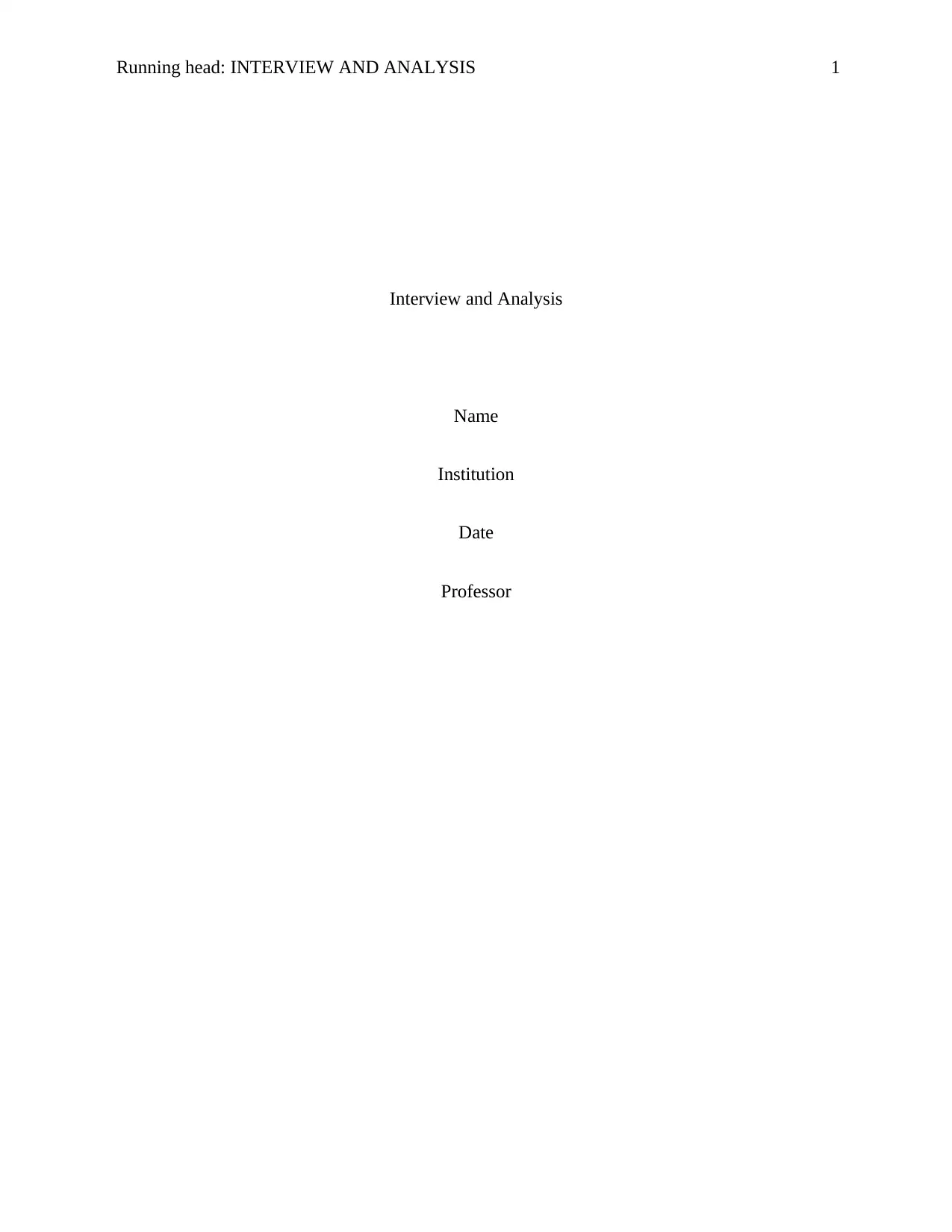
Running head: INTERVIEW AND ANALYSIS 1
Interview and Analysis
Name
Institution
Date
Professor
Interview and Analysis
Name
Institution
Date
Professor
Paraphrase This Document
Need a fresh take? Get an instant paraphrase of this document with our AI Paraphraser
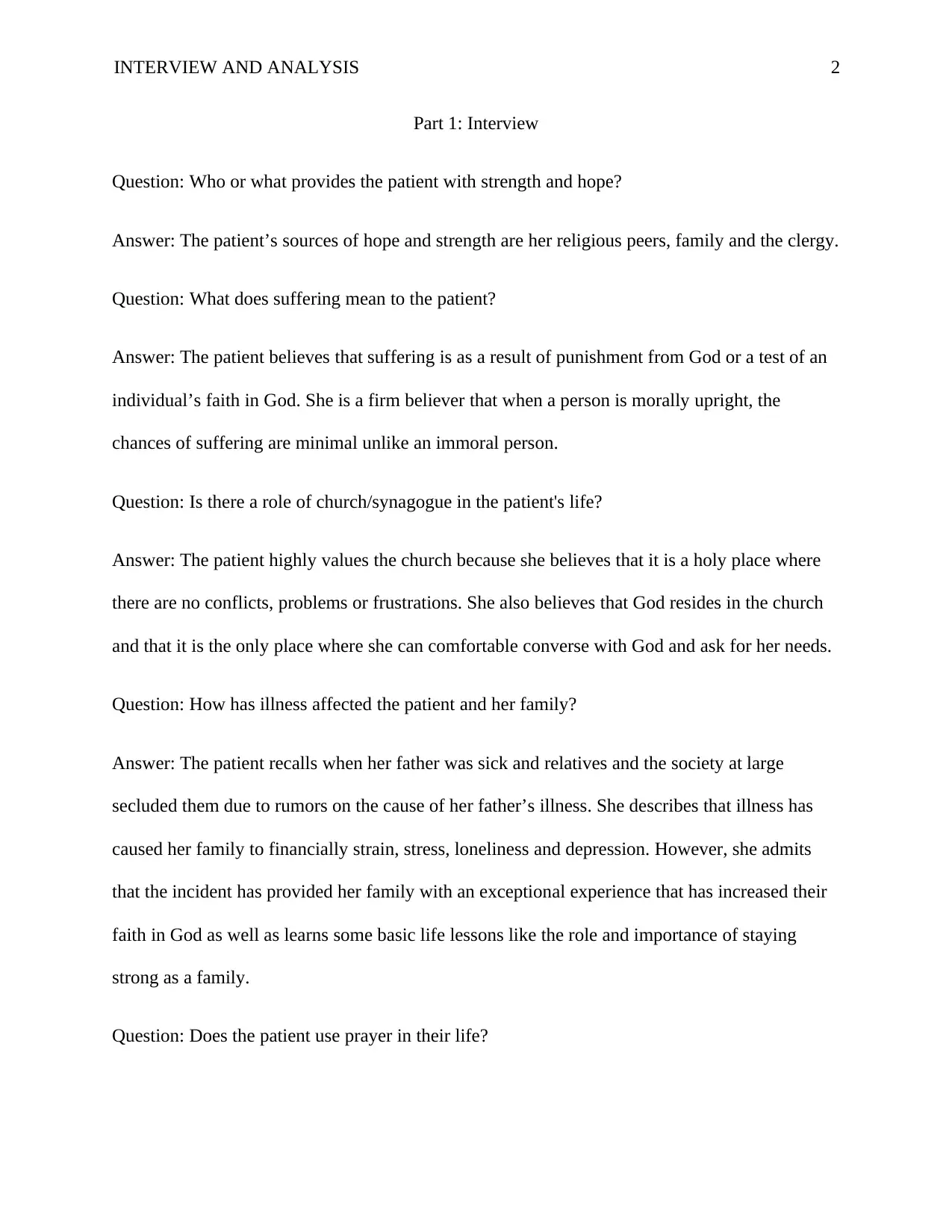
INTERVIEW AND ANALYSIS 2
Part 1: Interview
Question: Who or what provides the patient with strength and hope?
Answer: The patient’s sources of hope and strength are her religious peers, family and the clergy.
Question: What does suffering mean to the patient?
Answer: The patient believes that suffering is as a result of punishment from God or a test of an
individual’s faith in God. She is a firm believer that when a person is morally upright, the
chances of suffering are minimal unlike an immoral person.
Question: Is there a role of church/synagogue in the patient's life?
Answer: The patient highly values the church because she believes that it is a holy place where
there are no conflicts, problems or frustrations. She also believes that God resides in the church
and that it is the only place where she can comfortable converse with God and ask for her needs.
Question: How has illness affected the patient and her family?
Answer: The patient recalls when her father was sick and relatives and the society at large
secluded them due to rumors on the cause of her father’s illness. She describes that illness has
caused her family to financially strain, stress, loneliness and depression. However, she admits
that the incident has provided her family with an exceptional experience that has increased their
faith in God as well as learns some basic life lessons like the role and importance of staying
strong as a family.
Question: Does the patient use prayer in their life?
Part 1: Interview
Question: Who or what provides the patient with strength and hope?
Answer: The patient’s sources of hope and strength are her religious peers, family and the clergy.
Question: What does suffering mean to the patient?
Answer: The patient believes that suffering is as a result of punishment from God or a test of an
individual’s faith in God. She is a firm believer that when a person is morally upright, the
chances of suffering are minimal unlike an immoral person.
Question: Is there a role of church/synagogue in the patient's life?
Answer: The patient highly values the church because she believes that it is a holy place where
there are no conflicts, problems or frustrations. She also believes that God resides in the church
and that it is the only place where she can comfortable converse with God and ask for her needs.
Question: How has illness affected the patient and her family?
Answer: The patient recalls when her father was sick and relatives and the society at large
secluded them due to rumors on the cause of her father’s illness. She describes that illness has
caused her family to financially strain, stress, loneliness and depression. However, she admits
that the incident has provided her family with an exceptional experience that has increased their
faith in God as well as learns some basic life lessons like the role and importance of staying
strong as a family.
Question: Does the patient use prayer in their life?
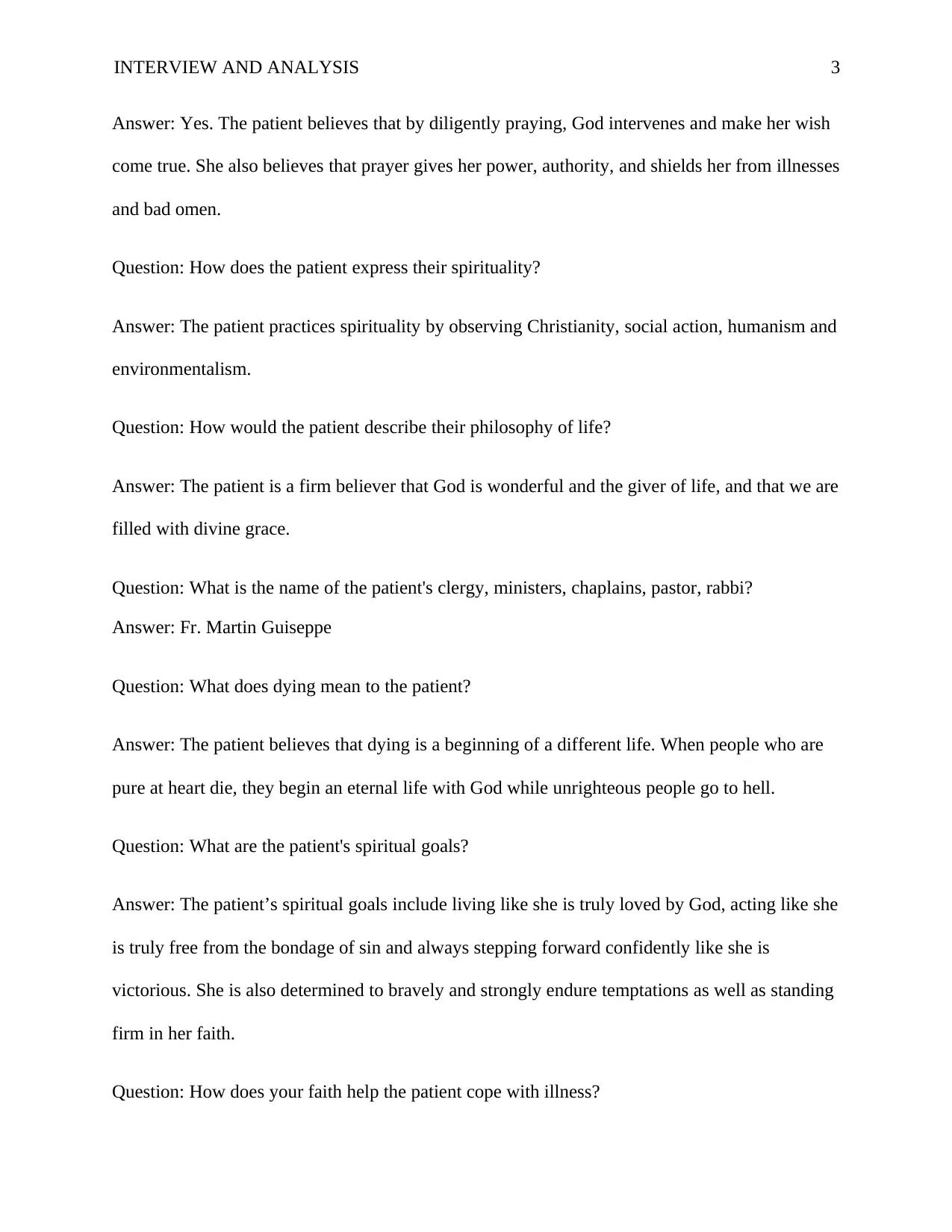
INTERVIEW AND ANALYSIS 3
Answer: Yes. The patient believes that by diligently praying, God intervenes and make her wish
come true. She also believes that prayer gives her power, authority, and shields her from illnesses
and bad omen.
Question: How does the patient express their spirituality?
Answer: The patient practices spirituality by observing Christianity, social action, humanism and
environmentalism.
Question: How would the patient describe their philosophy of life?
Answer: The patient is a firm believer that God is wonderful and the giver of life, and that we are
filled with divine grace.
Question: What is the name of the patient's clergy, ministers, chaplains, pastor, rabbi?
Answer: Fr. Martin Guiseppe
Question: What does dying mean to the patient?
Answer: The patient believes that dying is a beginning of a different life. When people who are
pure at heart die, they begin an eternal life with God while unrighteous people go to hell.
Question: What are the patient's spiritual goals?
Answer: The patient’s spiritual goals include living like she is truly loved by God, acting like she
is truly free from the bondage of sin and always stepping forward confidently like she is
victorious. She is also determined to bravely and strongly endure temptations as well as standing
firm in her faith.
Question: How does your faith help the patient cope with illness?
Answer: Yes. The patient believes that by diligently praying, God intervenes and make her wish
come true. She also believes that prayer gives her power, authority, and shields her from illnesses
and bad omen.
Question: How does the patient express their spirituality?
Answer: The patient practices spirituality by observing Christianity, social action, humanism and
environmentalism.
Question: How would the patient describe their philosophy of life?
Answer: The patient is a firm believer that God is wonderful and the giver of life, and that we are
filled with divine grace.
Question: What is the name of the patient's clergy, ministers, chaplains, pastor, rabbi?
Answer: Fr. Martin Guiseppe
Question: What does dying mean to the patient?
Answer: The patient believes that dying is a beginning of a different life. When people who are
pure at heart die, they begin an eternal life with God while unrighteous people go to hell.
Question: What are the patient's spiritual goals?
Answer: The patient’s spiritual goals include living like she is truly loved by God, acting like she
is truly free from the bondage of sin and always stepping forward confidently like she is
victorious. She is also determined to bravely and strongly endure temptations as well as standing
firm in her faith.
Question: How does your faith help the patient cope with illness?
⊘ This is a preview!⊘
Do you want full access?
Subscribe today to unlock all pages.

Trusted by 1+ million students worldwide
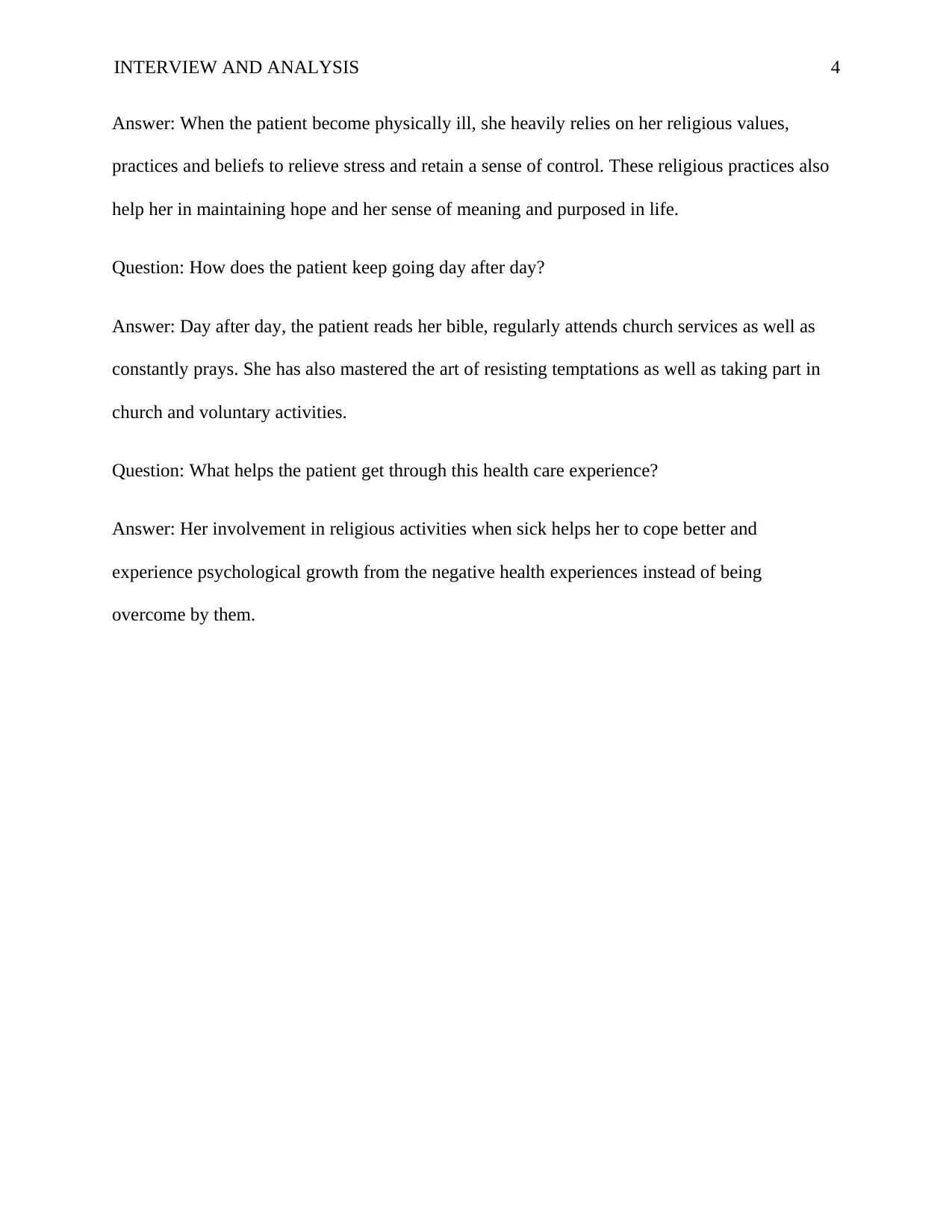
INTERVIEW AND ANALYSIS 4
Answer: When the patient become physically ill, she heavily relies on her religious values,
practices and beliefs to relieve stress and retain a sense of control. These religious practices also
help her in maintaining hope and her sense of meaning and purposed in life.
Question: How does the patient keep going day after day?
Answer: Day after day, the patient reads her bible, regularly attends church services as well as
constantly prays. She has also mastered the art of resisting temptations as well as taking part in
church and voluntary activities.
Question: What helps the patient get through this health care experience?
Answer: Her involvement in religious activities when sick helps her to cope better and
experience psychological growth from the negative health experiences instead of being
overcome by them.
Answer: When the patient become physically ill, she heavily relies on her religious values,
practices and beliefs to relieve stress and retain a sense of control. These religious practices also
help her in maintaining hope and her sense of meaning and purposed in life.
Question: How does the patient keep going day after day?
Answer: Day after day, the patient reads her bible, regularly attends church services as well as
constantly prays. She has also mastered the art of resisting temptations as well as taking part in
church and voluntary activities.
Question: What helps the patient get through this health care experience?
Answer: Her involvement in religious activities when sick helps her to cope better and
experience psychological growth from the negative health experiences instead of being
overcome by them.
Paraphrase This Document
Need a fresh take? Get an instant paraphrase of this document with our AI Paraphraser
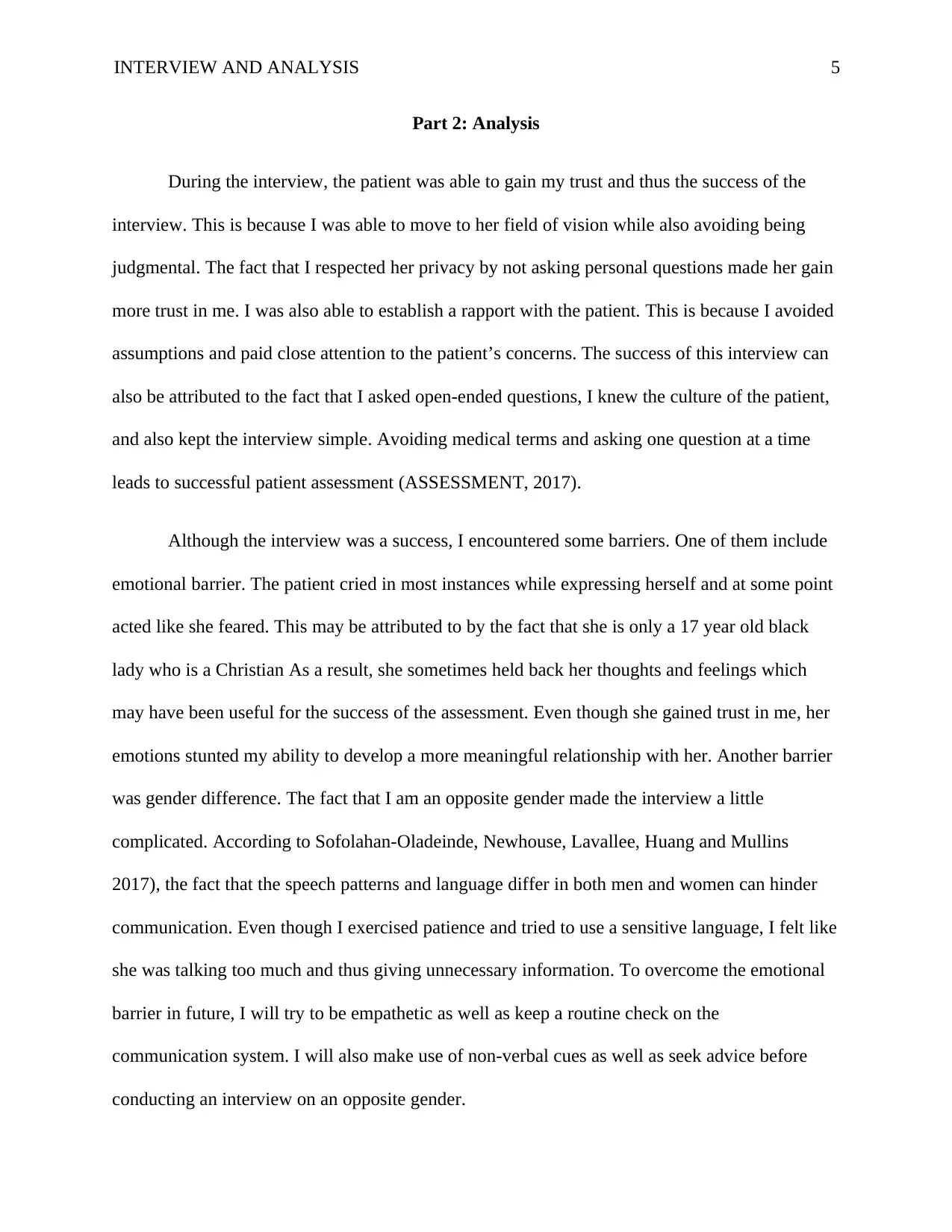
INTERVIEW AND ANALYSIS 5
Part 2: Analysis
During the interview, the patient was able to gain my trust and thus the success of the
interview. This is because I was able to move to her field of vision while also avoiding being
judgmental. The fact that I respected her privacy by not asking personal questions made her gain
more trust in me. I was also able to establish a rapport with the patient. This is because I avoided
assumptions and paid close attention to the patient’s concerns. The success of this interview can
also be attributed to the fact that I asked open-ended questions, I knew the culture of the patient,
and also kept the interview simple. Avoiding medical terms and asking one question at a time
leads to successful patient assessment (ASSESSMENT, 2017).
Although the interview was a success, I encountered some barriers. One of them include
emotional barrier. The patient cried in most instances while expressing herself and at some point
acted like she feared. This may be attributed to by the fact that she is only a 17 year old black
lady who is a Christian As a result, she sometimes held back her thoughts and feelings which
may have been useful for the success of the assessment. Even though she gained trust in me, her
emotions stunted my ability to develop a more meaningful relationship with her. Another barrier
was gender difference. The fact that I am an opposite gender made the interview a little
complicated. According to Sofolahan-Oladeinde, Newhouse, Lavallee, Huang and Mullins
2017), the fact that the speech patterns and language differ in both men and women can hinder
communication. Even though I exercised patience and tried to use a sensitive language, I felt like
she was talking too much and thus giving unnecessary information. To overcome the emotional
barrier in future, I will try to be empathetic as well as keep a routine check on the
communication system. I will also make use of non-verbal cues as well as seek advice before
conducting an interview on an opposite gender.
Part 2: Analysis
During the interview, the patient was able to gain my trust and thus the success of the
interview. This is because I was able to move to her field of vision while also avoiding being
judgmental. The fact that I respected her privacy by not asking personal questions made her gain
more trust in me. I was also able to establish a rapport with the patient. This is because I avoided
assumptions and paid close attention to the patient’s concerns. The success of this interview can
also be attributed to the fact that I asked open-ended questions, I knew the culture of the patient,
and also kept the interview simple. Avoiding medical terms and asking one question at a time
leads to successful patient assessment (ASSESSMENT, 2017).
Although the interview was a success, I encountered some barriers. One of them include
emotional barrier. The patient cried in most instances while expressing herself and at some point
acted like she feared. This may be attributed to by the fact that she is only a 17 year old black
lady who is a Christian As a result, she sometimes held back her thoughts and feelings which
may have been useful for the success of the assessment. Even though she gained trust in me, her
emotions stunted my ability to develop a more meaningful relationship with her. Another barrier
was gender difference. The fact that I am an opposite gender made the interview a little
complicated. According to Sofolahan-Oladeinde, Newhouse, Lavallee, Huang and Mullins
2017), the fact that the speech patterns and language differ in both men and women can hinder
communication. Even though I exercised patience and tried to use a sensitive language, I felt like
she was talking too much and thus giving unnecessary information. To overcome the emotional
barrier in future, I will try to be empathetic as well as keep a routine check on the
communication system. I will also make use of non-verbal cues as well as seek advice before
conducting an interview on an opposite gender.
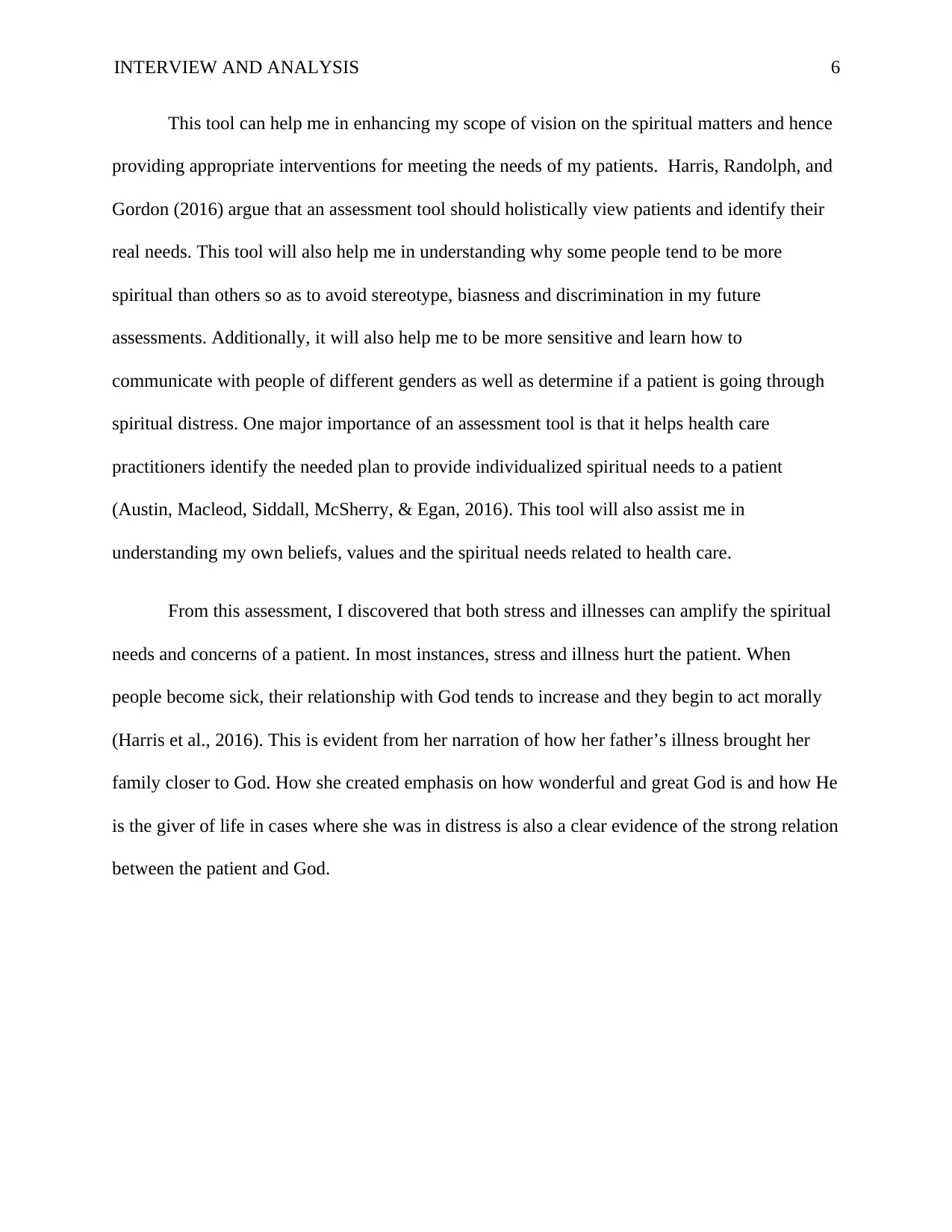
INTERVIEW AND ANALYSIS 6
This tool can help me in enhancing my scope of vision on the spiritual matters and hence
providing appropriate interventions for meeting the needs of my patients. Harris, Randolph, and
Gordon (2016) argue that an assessment tool should holistically view patients and identify their
real needs. This tool will also help me in understanding why some people tend to be more
spiritual than others so as to avoid stereotype, biasness and discrimination in my future
assessments. Additionally, it will also help me to be more sensitive and learn how to
communicate with people of different genders as well as determine if a patient is going through
spiritual distress. One major importance of an assessment tool is that it helps health care
practitioners identify the needed plan to provide individualized spiritual needs to a patient
(Austin, Macleod, Siddall, McSherry, & Egan, 2016). This tool will also assist me in
understanding my own beliefs, values and the spiritual needs related to health care.
From this assessment, I discovered that both stress and illnesses can amplify the spiritual
needs and concerns of a patient. In most instances, stress and illness hurt the patient. When
people become sick, their relationship with God tends to increase and they begin to act morally
(Harris et al., 2016). This is evident from her narration of how her father’s illness brought her
family closer to God. How she created emphasis on how wonderful and great God is and how He
is the giver of life in cases where she was in distress is also a clear evidence of the strong relation
between the patient and God.
This tool can help me in enhancing my scope of vision on the spiritual matters and hence
providing appropriate interventions for meeting the needs of my patients. Harris, Randolph, and
Gordon (2016) argue that an assessment tool should holistically view patients and identify their
real needs. This tool will also help me in understanding why some people tend to be more
spiritual than others so as to avoid stereotype, biasness and discrimination in my future
assessments. Additionally, it will also help me to be more sensitive and learn how to
communicate with people of different genders as well as determine if a patient is going through
spiritual distress. One major importance of an assessment tool is that it helps health care
practitioners identify the needed plan to provide individualized spiritual needs to a patient
(Austin, Macleod, Siddall, McSherry, & Egan, 2016). This tool will also assist me in
understanding my own beliefs, values and the spiritual needs related to health care.
From this assessment, I discovered that both stress and illnesses can amplify the spiritual
needs and concerns of a patient. In most instances, stress and illness hurt the patient. When
people become sick, their relationship with God tends to increase and they begin to act morally
(Harris et al., 2016). This is evident from her narration of how her father’s illness brought her
family closer to God. How she created emphasis on how wonderful and great God is and how He
is the giver of life in cases where she was in distress is also a clear evidence of the strong relation
between the patient and God.
⊘ This is a preview!⊘
Do you want full access?
Subscribe today to unlock all pages.

Trusted by 1+ million students worldwide
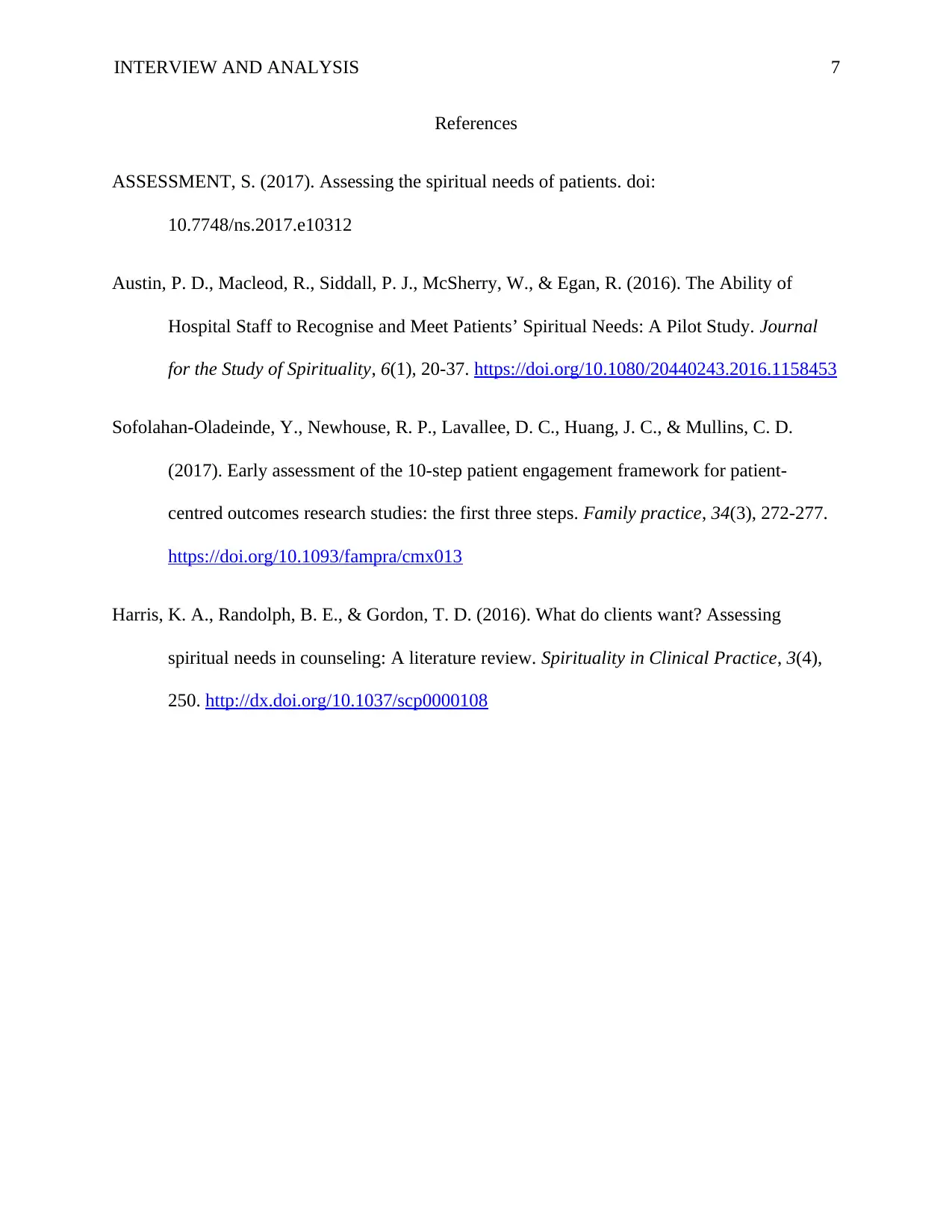
INTERVIEW AND ANALYSIS 7
References
ASSESSMENT, S. (2017). Assessing the spiritual needs of patients. doi:
10.7748/ns.2017.e10312
Austin, P. D., Macleod, R., Siddall, P. J., McSherry, W., & Egan, R. (2016). The Ability of
Hospital Staff to Recognise and Meet Patients’ Spiritual Needs: A Pilot Study. Journal
for the Study of Spirituality, 6(1), 20-37. https://doi.org/10.1080/20440243.2016.1158453
Sofolahan-Oladeinde, Y., Newhouse, R. P., Lavallee, D. C., Huang, J. C., & Mullins, C. D.
(2017). Early assessment of the 10-step patient engagement framework for patient-
centred outcomes research studies: the first three steps. Family practice, 34(3), 272-277.
https://doi.org/10.1093/fampra/cmx013
Harris, K. A., Randolph, B. E., & Gordon, T. D. (2016). What do clients want? Assessing
spiritual needs in counseling: A literature review. Spirituality in Clinical Practice, 3(4),
250. http://dx.doi.org/10.1037/scp0000108
References
ASSESSMENT, S. (2017). Assessing the spiritual needs of patients. doi:
10.7748/ns.2017.e10312
Austin, P. D., Macleod, R., Siddall, P. J., McSherry, W., & Egan, R. (2016). The Ability of
Hospital Staff to Recognise and Meet Patients’ Spiritual Needs: A Pilot Study. Journal
for the Study of Spirituality, 6(1), 20-37. https://doi.org/10.1080/20440243.2016.1158453
Sofolahan-Oladeinde, Y., Newhouse, R. P., Lavallee, D. C., Huang, J. C., & Mullins, C. D.
(2017). Early assessment of the 10-step patient engagement framework for patient-
centred outcomes research studies: the first three steps. Family practice, 34(3), 272-277.
https://doi.org/10.1093/fampra/cmx013
Harris, K. A., Randolph, B. E., & Gordon, T. D. (2016). What do clients want? Assessing
spiritual needs in counseling: A literature review. Spirituality in Clinical Practice, 3(4),
250. http://dx.doi.org/10.1037/scp0000108
1 out of 7
Related Documents
Your All-in-One AI-Powered Toolkit for Academic Success.
+13062052269
info@desklib.com
Available 24*7 on WhatsApp / Email
![[object Object]](/_next/static/media/star-bottom.7253800d.svg)
Unlock your academic potential
Copyright © 2020–2026 A2Z Services. All Rights Reserved. Developed and managed by ZUCOL.





